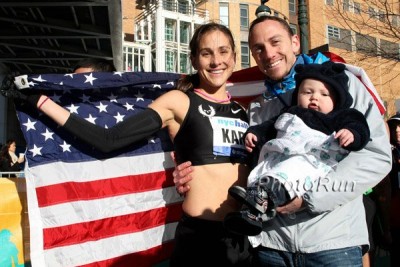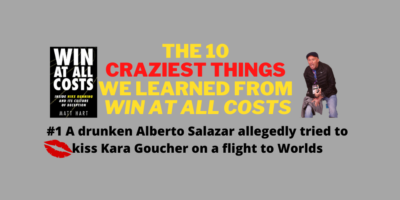The 10 Craziest Things We Learned From “Win At All Costs,” the New Book About Alberto Salazar & the Nike Oregon Project
By LetsRun.com
October 29, 2020
Earlier this month, Win At All Costs: Inside Nike Running and Its Culture of Deception, the book from investigative journalist Matt Hart detailing the rise and fall of the Nike Oregon Project under Alberto Salazar, was published. Hart joined the LetsRun.com podcast as a guest this week to talk about his reporting of the book, and we strongly recommend that you buy the book as it’s definitely worth a read. Not only is it the definitive story of Salazar’s time at NOP, but it also offers context by exploring Nike’s origins and the history of its sponsorship of professional running, including Athletics West in the 1970s and 1980s.
Many of the details of the NOP saga were already well-known thanks to the work of ProPublica, the BBC, and a handful of other whistleblowers and journalists, as well as the leaked USADA interim report from 2017 and the arbitration decision announcing Salazar’s ban in 2019, but Hart did a remarkable job of tying them all together in the definitive narrative. Hart also did plenty of his own reporting for Win At All Costs. Some of the revelations in the book we had forgotten about; others we had only heard as rumors, while others were completely new.
Below, we share the 10 craziest things we learned from Win At All Costs, though this is by no means an exhaustive list, so make sure you buy the book if you want the full scoop.
Our full review of the book, which we rate 5 stars out of 5, is here: LRC Book Review: “Win At All Costs” Tells the Definitive Story of the Rise and Fall of the Nike Oregon Project
1) A drunken Salazar allegedly attempted to kiss Kara Goucher on the mouth on the flight to the 2011 World Championships
The book cites a source who says that on a flight to the 2011 World Championships, Salazar tried to kiss Kara Goucher on the lips. Kara, who has said that Salazar had been like a father to her at one point, would neither confirm nor deny the incident, telling Hart she didn’t want to talk about it. An incident like this helps explain why it’s been clear in interviews that Adam Goucher has had a strong personal hatred of Salazar.
2) The book reveals that several of Jerry Schumacher’s athletes visited the now-banned Dr. Jeffrey Brown, with Salazar going so far as to credit Chris Solinsky’s 26:59 10,000 as the result of being on thyroid medication
Hart writes that in August 2011, Salazar was asked how Chris Solinsky had gotten so good all of a sudden; the previous year, Solinsky had shocked the world by becoming the first non-African-born runner to break 27:00 for 10,000 meters. “It’s the thyroid,” Salazar said, before claiming that four other members of rival Nike coach Jerry Schumacher‘s group were on thyroid medication.
According to Hart, after several of Salazar’s athletes found success after being placed on thyroid medication by Dr. Jeffrey Brown in Houston, there was internal pressure from Nike on Schumacher to send his athletes to Brown, which he did. The book also claims two of Schumacher’s top athletes, Solinsky and Matt Tegenkamp, were on “a high dose” of asthma drug Advair in 2013.
Unlike Salazar, however, Schumacher grew skeptical about Dr. Brown’s diagnoses. It seemed statistically improbable to him that all of his star athletes would have similar medical problems. Eventually, Schumacher took action, telling his runners to see at least two doctors “outside the Nike ecosystem” to garner second and third opinions.
“Jerry was like, Look, no, stop this right now, this doesn’t make that much sense to me,” Hart said on the LetsRun.com podcast.
3) Mary Decker Slaney’s ex-husband Ron Tabb says he and Slaney were offered performance-enhancing drugs at Athletics West
It’s long been known that some members of Athletics West, the Nike-sponsored, Eugene-based training group of the 1970s and 1980s, experimented with performance-enhancing drugs, but it’s never been clear exactly how widespread or officially sanctioned PED use within the team was. Former World XC champion Craig Virgin has alleged that the team’s exercise physiologist, Dick Brown, was involved with the PED usage/monitoring.
In the book, Hart reveals that Mary Decker Slaney‘s ex-husband, marathoner Ron Tabb, told Hart that he and Slaney were offered drugs by Brown in 1981 or 1982. Tabb said neither took Brown up on the offer but that “Mary was intrigued with the prospect. I know she was open to the proposal.”
Jeff Johnson, Nike’s first employee who was in charge of “all things running” at the company at the time, also said, “I’d bet my life that Mary would be crazy enough to consider that kind of thing” — though he said he had no direct knowledge of steroid use within the group.
4) Salazar was a frequent visitor to LetsRun.com and used the site to help guide Kara Goucher’s 2011 Boston Marathon preparation
Though Salazar told athletes to stay off the LetsRun.com messageboard, Kara Goucher said that when she would meet with him in his Nike cubicle, “his browser seemed permanently stuck on the site.” In addition, former NOP assistant coach Steve Magness recalled Salazar telling him that “on the LetsRun messageboards people were talking about training for Boston and they said the biggest thing you have to worry about is the downhills.”
Salazar, who won Boston in 1982, incorporated this advice into Goucher’s 2011 Boston buildup in a big way — so much so that he had to be talked out of Goucher running 8 x 400m downhill on the course just two days before the race. “In my head, I’m thinking, Dude, you won Boston. Why are you reading LetsRun to understand this?” said Magness.
5) Galen Rupp considered leaving Salazar after the 2011 Worlds
Kara Goucher recalled running with Rupp after the 2011 Worlds in Daegu, where Rupp, disappointed after finishing 7th in the 10,000 and 9th in the 5,000, revealed he was considering leaving his longtime coach.
“He’s too controlling and involved in my life,” Rupp told Goucher. Rupp ultimately elected to stay and earned an Olympic silver medal the following year.
6) Salazar gave NOP athletes burner phones at the 2008 Olympic Trials and tested their loyalty by posing as Oregonian reporter Ken Goe
Salazar told his athletes not to talk to the media ahead of the 2008 Olympic Trials, telling NOP members to put away their phones and use burner devices that only contained the numbers for Salazar and NOP sports psychologist Darren Treasure. Later, Salazar texted Kara Goucher’s phone pretending to be Oregonian reporter Ken Goe asking for an interview. Once Kara denied the request, he responded, “Good job, you passed, this is Alberto!”
7) Everything about Kara Goucher’s pregnancy
In 2008, the Gouchers were thinking about having a baby. On November 3, the morning after Kara finished 3rd in the New York City Marathon, the Gouchers received a fax at their hotel from Salazar with a graph demonstrating when they were allowed to have a baby, accompanied by some writing:
Option 1: You go through fertility treatment and have a baby.
Option 2: Adam takes a cold shower. Adam keeps taking cold showers.
At the end of 2009, the Gouchers asked Salazar if it was a good time for Kara to get pregnant as they wanted to make sure a pregnancy wouldn’t impact Kara’s “professional standing” with Nike. Salazar said he’d check with Nike head of sports marketing John Capriotti and told the Gouchers that Capriotti said “as long as we still see her out and about and she’s making appearances, she’s fine.” They assumed this meant Kara would continue to get paid if she made appearances for Nike, which she did.
Later, however, Nike suspended Goucher’s contract (without pay) for a year because she had gone a year without racing, with Nike VP of global sports marketing John Slusher telling them “[Capriotti] doesn’t remember saying that and there’s nothing in writing.” Eventually, Goucher’s contract suspension was reduced to six months.
8) Adam Goucher was offered $90,000 per year by Nike coming out of college; Kara Goucher signed for only $35,000
Professional running contracts are notoriously secretive, often protected by nondisclosure agreements, so it was interesting to learn some specific dollar values when it came to the Gouchers — even if some of the numbers were from over 20 years ago.
The Gouchers put together very similar collegiate resumes. In 1998, Adam’s final year at the University of Colorado, he won NCAA titles in the indoor 3k, outdoor 5k, and cross country. He was offered a base annual salary of $90,000 from Nike, but instead signed with Fila, which offered a base salary of $50,000 but lucrative bonuses (Goucher hit those bonuses and was making $180,000 by the end of his first year with Fila).
Like Adam, Kara also won three NCAA titles in her final year at Colorado (outdoor 3k/5k and cross country) but received an initial base salary of just $35,000 with Nike (though she’d eventually end up making in the six figures). More recently, Jackie Areson earned a base salary of $30,000 per year (plus a $7500 travel/medical allowance) when signing with NOP in 2011. Areson had won the NCAA indoor 5k title earlier that year for Tennessee.
9) Salazar would use crazy remedies to treat injuries and once gave his son “gas station dick pills” to see if they actually boosted testosterone
Salazar comes off very much like a mad scientist in the book, willing to try anything if he thinks it will help his athletes. Some of his ideas were downright crazy. Once, he treated one of Kara Goucher’s injuries by wrapping her leg in a combination of crushed-up aspirin and dimethyl sulfoxide (a lotion used to reduce inflammation in horses), which resulted in a second-degree burn. Later, he used jelly to create a homemade orthotic for Kara, with Salazar’s dog licking the jelly off her foot. He once had Adam Goucher run a workout with one spike and one normal running shoe in an attempt to alleviate shin pain.
Of course, Salazar’s obsession with testosterone is also well known — his experiment with the substance on his sons is one of the reasons he’s currently banned from the sport. According to Magness, Salazar once gave his son Alex “gas station dick pills” to see if they actually increased his testosterone levels.
10) Salazar celebrated injuries to rival athletes
This allegation comes from Magness who claims Salazar enjoyed seeing Chris Solinsky’s 2011 season cut short due to a hamstring avulsion that would ultimately end his career. Solinsky, coached by Salazar’s rival Jerry Schumacher, had beaten Galen Rupp in the 5,000 at USAs earlier in the year and had stolen Rupp’s thunder the previous year by breaking the 27:00 barrier and the American 10,000-meter record at the Payton Jordan Invitational.
“Alberto was happy about [the injury],” Magness said. “He was like, ‘See, I knew this would happen to them.'”
According to Danny Mackey, John Capriotti also once offered an athlete money if they tripped another athlete in a race.
Purchase Win At All Costs here and support LetsRun.com in the process. Talk about the new book on our messageboard. MB: Matt Hart’s new Nike book is great – Salazar once tried to kiss Kara Goucher and said Solinsky ran 26:59 because of thyroid meds
More: LRC Book Review: “Win At All Costs” Tells the Definitive Story of the Rise and Fall of the Nike Oregon Project – 5 Stars Out Of 5 We loved the book and recommend you read it.
LRC 26:59! How Chris Solinsky Transformed a “Glorified Tempo” Into an All-Time Upset and Performance









